This woman learnt the names and dreams of all 21 migrant cleaners in her estate
by Gracia Lee // May 15, 2021, 1:43 pm
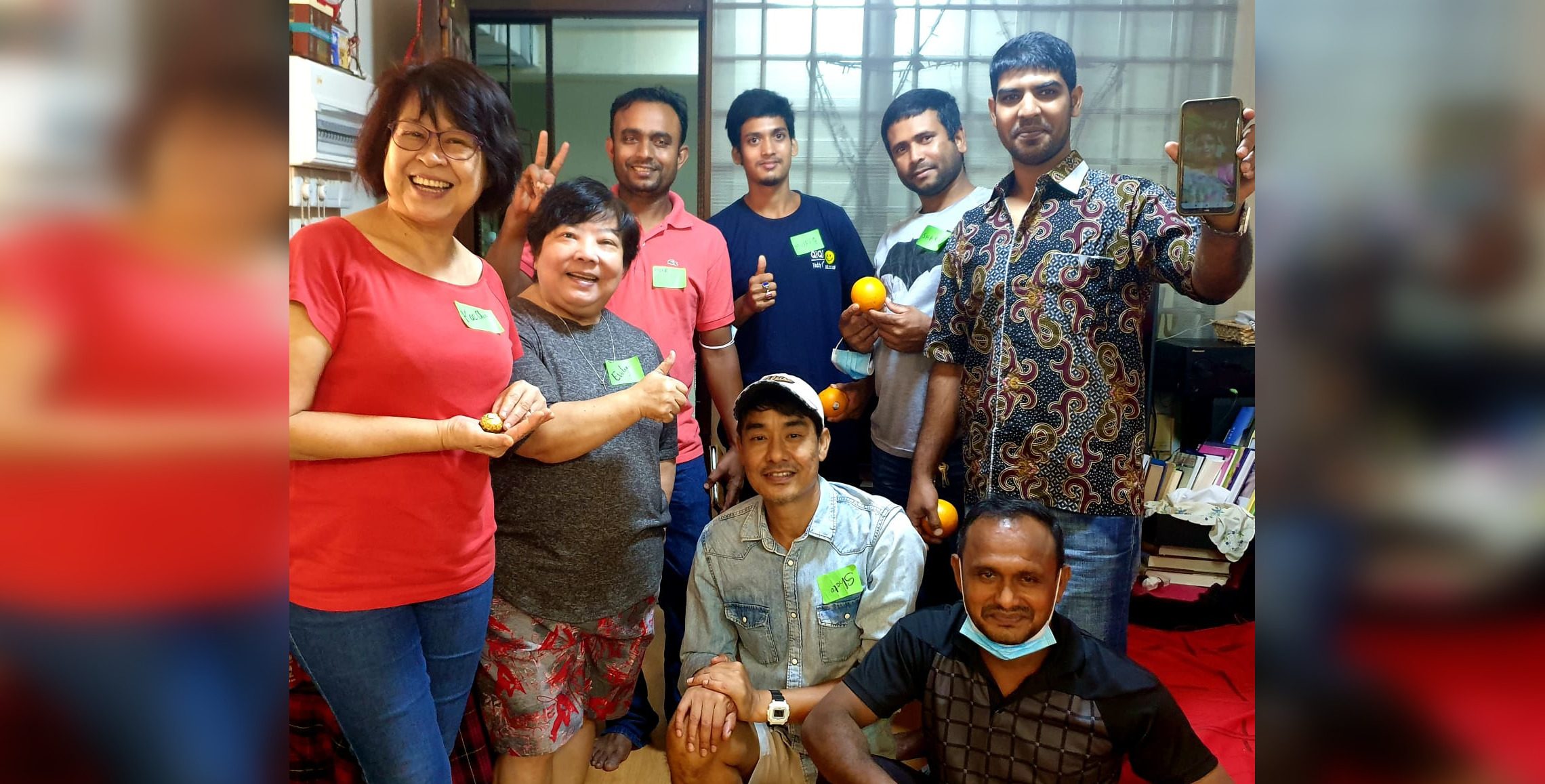
"Treat them as equals," says Wong Kae Chee (left), who began inviting the cleaners of her neighbourhood into her home with the help of some friends this year (when eight visitors were still allowed). All photos courtesy of Wong Kae Chee.
“Manick! Where are you? Okay, stay there. I’m coming to find you,” Wong Kae Chee, 65, tells the cleaner in charge of her HDB block over a WhatsApp call.
Winding through the blocks downstairs, she divulges a tip on how to find Manick: “Follow the sound of water or the sound of sweeping. Or look around for the water hose or the large rubbish bins.”
She finds Manick hosing down the staircase on the 20th floor of a nearby block. The moment he catches sight of her, his face lights up with a smile.
“Aunty!”
“Manick!”
They greet each other like old friends. In fact, that’s exactly what they are, Manick says.
“Aunty good friend,” he tells Salt&Light. “I so long time see her, 14 years.”
Wong passes him a paper bag with a large packet of coffee powder and two boxes of Vitamin C to share with his friends – the reason for her drop-in that afternoon.
“Aunty good friend. I so long time see her, 14 years.”
They spend a few minutes chatting about nothing much in particular – his day’s work, neighbours they both know and their plans to have a picnic with a few others at the Singapore Botanic Gardens on Hari Raya Puasa, as he has the day off from 2pm.
They also chat about the one thing that has been weighing on everyone’s minds: The ongoing pandemic.
“Now very difficult,” he sighs as he tells her. “Bangladesh, India, no oxygen, no ventilator. Doctor also die. Covid go already, all men happy.”
After leaving Manick to his work, Wong follows the sound of the water hose once again and makes her way down two floors, where she finds another cleaner.
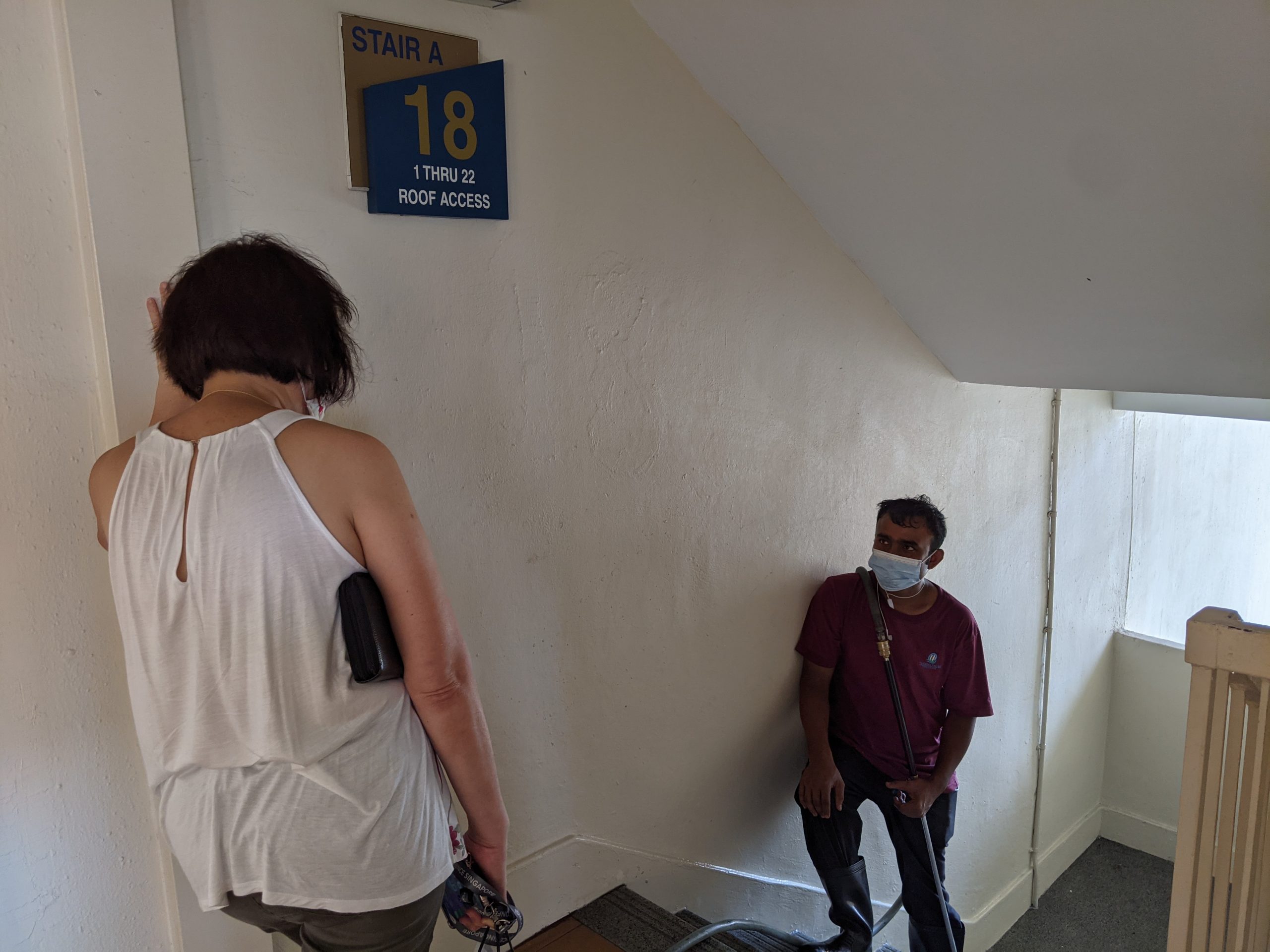
Wong greeting Kadir after finding him hosing down the staircase. Photo by Gracia Lee.
“Kadir!”
“Hello, Aunty!”
They make small talk, and Kadir shares in passing that there was an elderly man who attempted suicide at the next block at about 8am that morning.
“His heart must be very, very sad,” Wong says to him. “If you have any problem, you talk to us. We will help.”
Cookies and a can of Coke
In the two decades that she has lived in the Holland estate, Wong has gotten to know all 21 of the cleaners in her neighbourhood by name.
“Manick, Kadir, Musfiq, Sharif, Jony, Sojol, Maimun, Shahim, Saddam, Salam …” she rattles off impressively, despite admitting that she sometimes still gets them mixed up, especially now that all of them wear masks.
“What can make their lives a bit better? I can’t change the rules. But I can be kinder to them.”
“We’re friends,” says the private piano teacher matter-of-factly.
She knows something about their families back home – how many kids they have and how old they are, how their wives and parents are doing.
She knows their hang-out spot and where in the estate they are likely to be found at each part of the day.
She knows how hard they work, having seen them out and about from 8am to 10pm. And while they do not complain, she finds it troubling that they have to work such long hours, and sometimes on public holidays too.
“I just imagine if my son was the one working in a foreign country, how would I feel? So, I put myself in their shoes. What can make their lives a bit better? I can’t change the rules. But I can be kinder to them,” she says.
This, she does through simple everyday gestures – saying hello, learning their names and passing them cookies or a can of Coke when she sees them around.
If she learns that they have a need, she does what she can to meet them. Just the other day, she headed down to a nearby pharmacy to buy some painkillers for a cleaner whom she saw limping.
About twice a month, when she knows Manick is scheduled to wash the floors of her block, she takes a pail of water, detergent and a hard broom and scrubs her section of the corridor and the adjoining lift lobby.
“When he comes around, I tell him, ‘No need. I’ve already washed.’ Saves him time, saves him effort,” she says, adding that she recently noticed that her neighbours have started doing the same.
Living room chats
Last May, she began a practice of buying all 21 of them a meal on festive occasions like Christmas, Hari Raya and Deepavali, with the help of a group of 10 friends who chip in to offer food and friendship.
They buy each worker a packet of $6.50 mutton briyani from their favourite coffee shop stall, as well as a can of Coke, which Wong knows they love. They also throw in some hard-boiled eggs, achar and papadum to the meal.
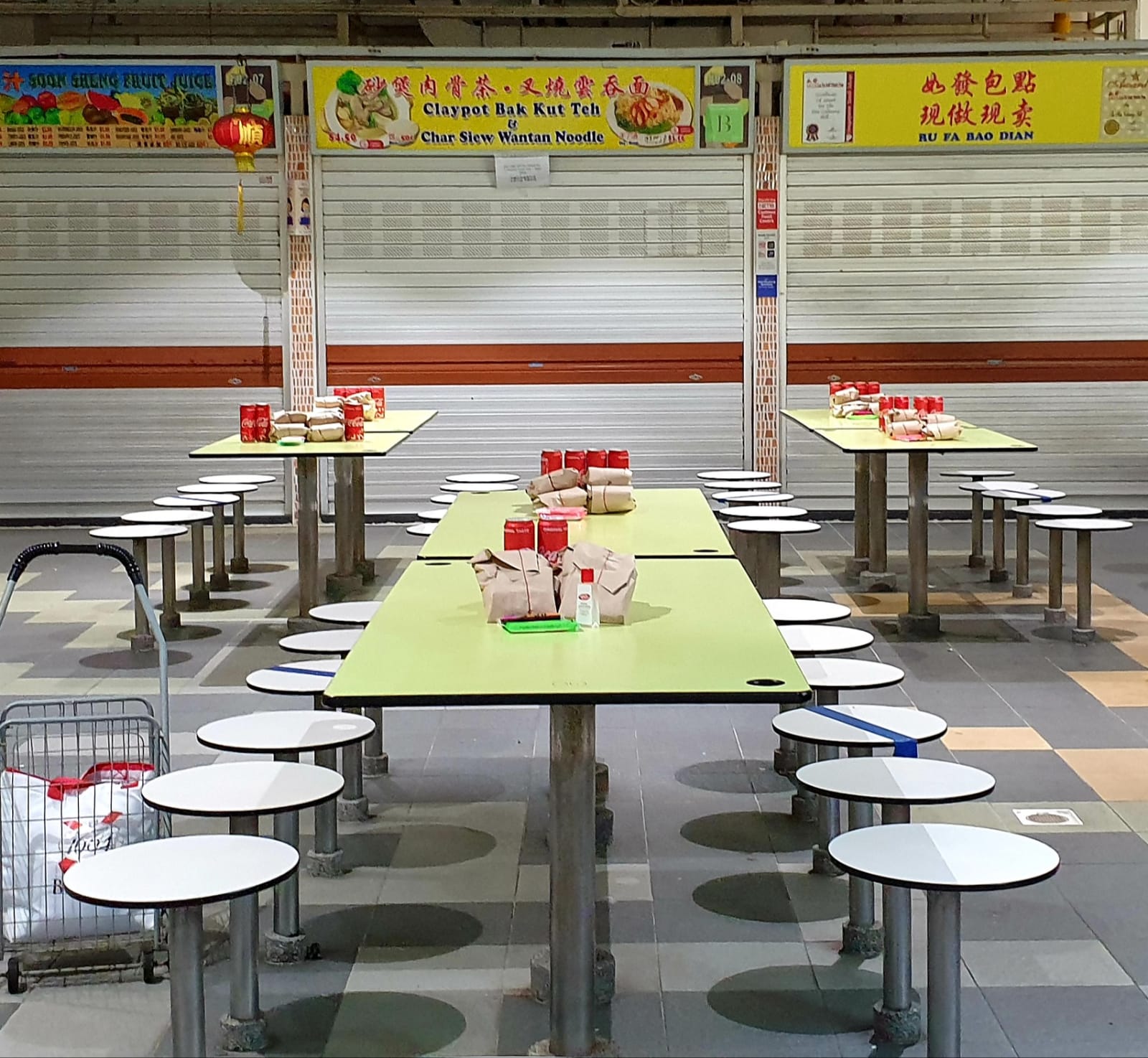
Wong leaves the packets of food and cans of Coke, along with bottles of hand sanitiser, on the tables of a nearby hawker centre for the cleaners to pick up for lunch.
To top it all off, the friends pack for the workers a goodie bag each of biscuits, nuts, coffee powder and chocolates. “It’s not a lot, but it’s just a gesture,” says Wong, who says all this does not cost more than $200.
This year, she decided to take her friendship with her migrant friends up a notch by inviting small groups of them into her home for dinner, along with one or two of her friends.
“I was inspired by the foreword of one of Dr Tan Lai Yong’s books, where he said that he dreams of the day every Singapore home will invite one foreign worker into their home for dinner,” she says.
During these meals, they sit on the floor of her living room – she does not have a dining table – and chat about work and their families.
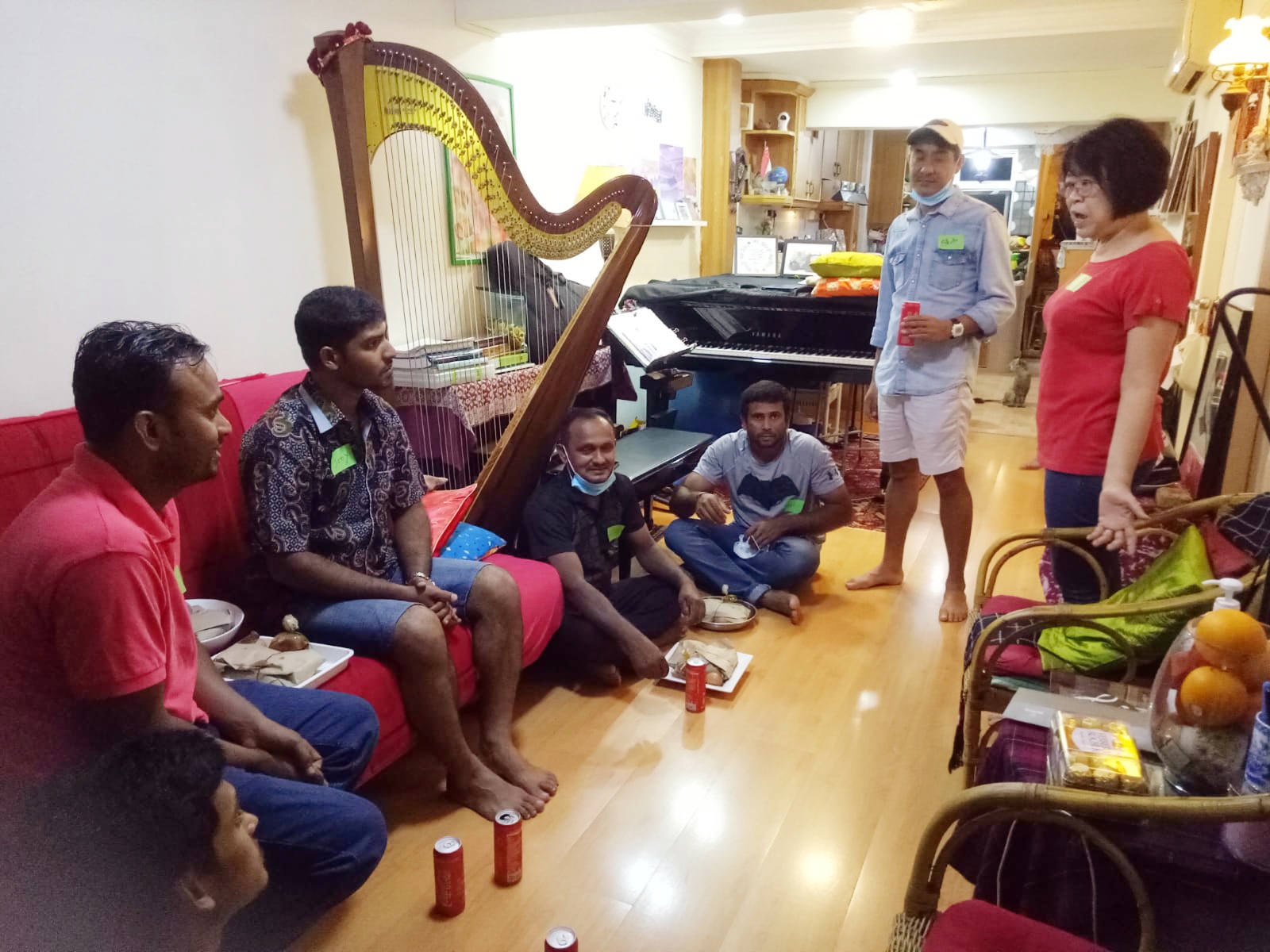
During dinner (when eight visitors were allowed), they sit around her living room, eating and chatting about their lives and dreams.
“We talk about their dreams. One wants to get married next year. He desires to be there for his children when they come, so he wants to start a pharmacy. Another wants to set up a guesthouse with the cleaning, cooking and English skills he’s picked up in Singapore.”
When Wong hears that their family is sick or in need, she will offer to pray for them, she says. Sometimes, they are the ones who ask for prayer.
Every now and then, she and her friends find creative ways to share the message of God’s love with them. Once, a friend painted the fruit of the Spirit on the shells of the hard-boiled eggs, and Wong took the time to explain to them what each one meant.
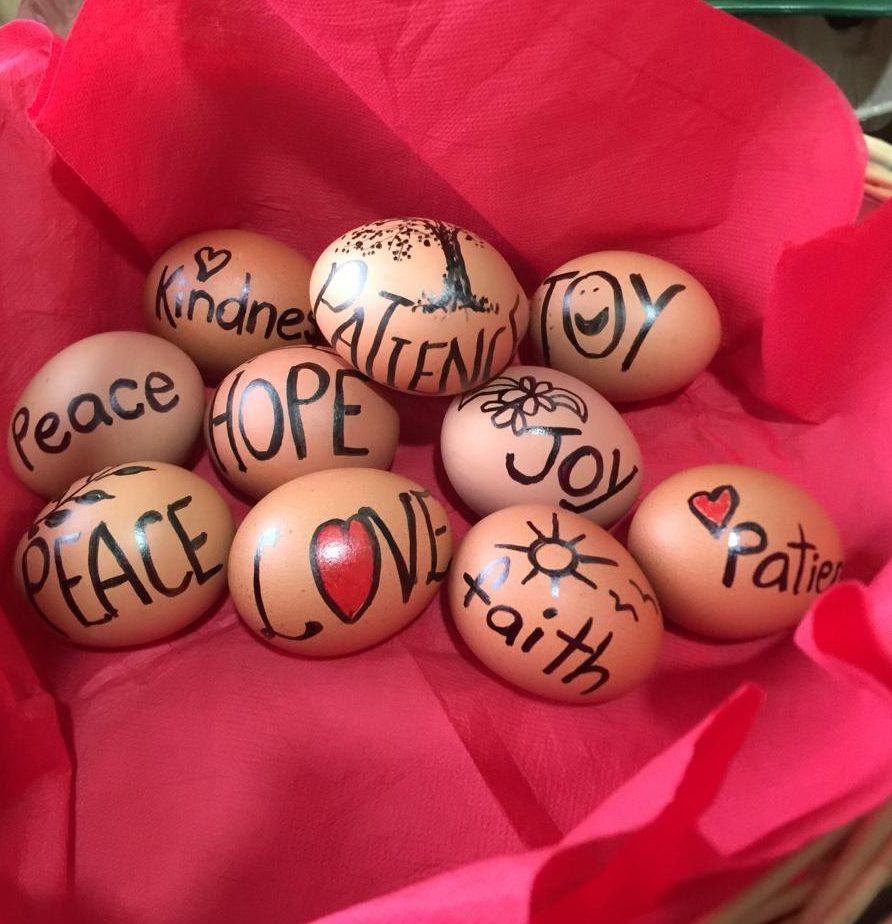
Wong and her friends use creative ways to share the Good News with their migrant friends, such as by painting the fruit of the Spirit on hard boiled eggs.
“I tell them, ‘Jesus says to love one another. God is our Father, so we are brothers and sisters, never mind if we have different skin colours. ‘ As for peace, I say, ‘The world has got no more peace. Everywhere fight, fight. The only peace is what God gives us in our heart.'”
Catching hospitality
The love that she shows to her migrant worker friends is not anything unusual or special, at least not to Wong. Growing up, hospitality was ingrained in her family life.
“There were always strangers in my home. Not just for meals, but in my bed too, and I would sleep on the floor.”
The family of 10 lived in the parsonage at Kum Yan Methodist Church, which her father pastored. It was a tiny place with just two bedrooms and one bathroom, recalls Wong.
But that did not stop her parents from taking in whoever needed a roof over their head.
“There were always strangers in my home. Not just for meals, but in my bed too,” she says with a laugh. “Very often I’d come home and my mother would say, ‘You sleep on the floor.'”
The children, among whom Wong is the eldest, were taught not to grumble about why someone else was in their bed, or why they had less than usual to eat for dinner.
“When people come to your door, it means they have a need. And, even if they don’t ask, you have to meet their need,” she recalls her mum saying.
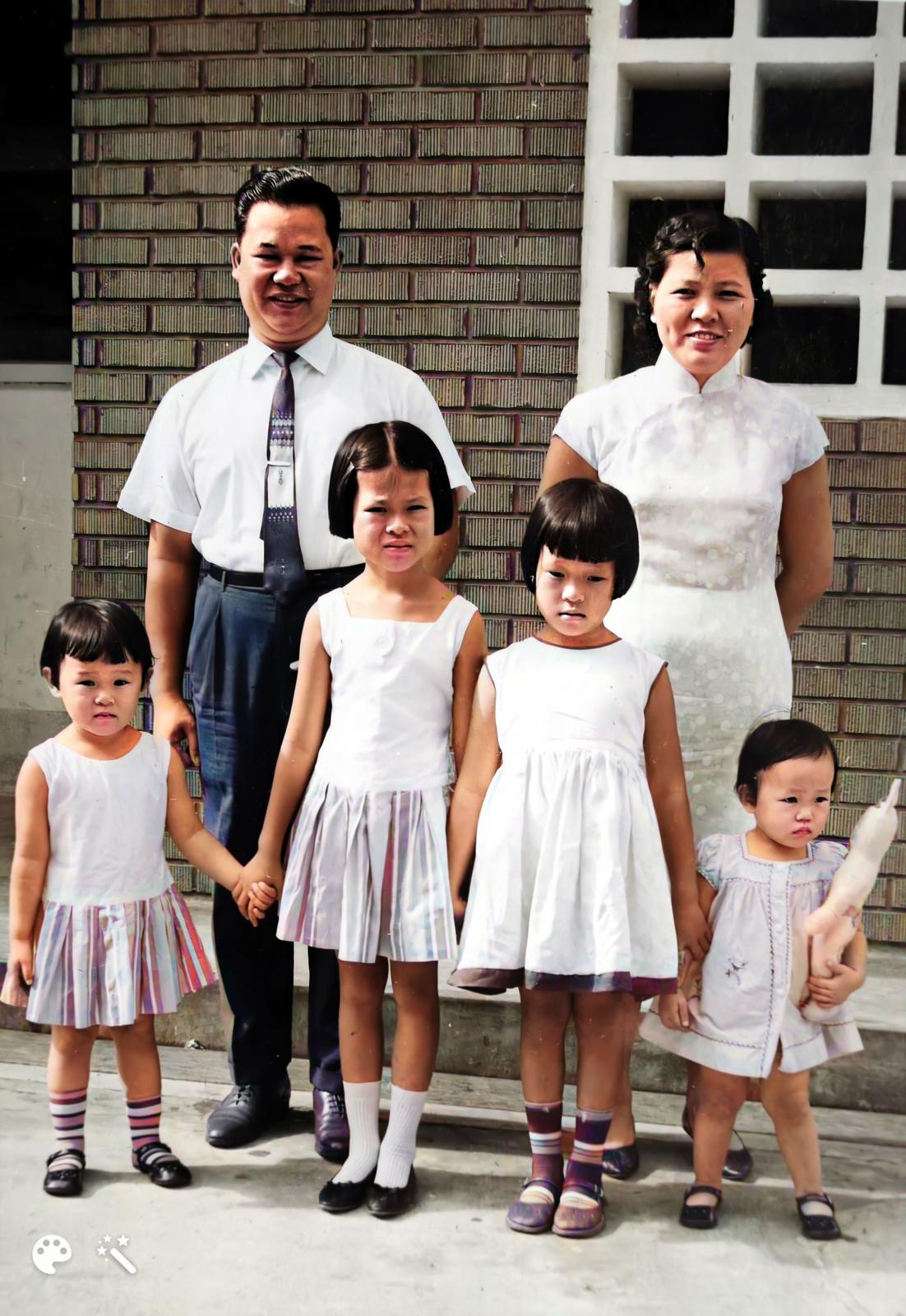
Wong (centre) with her family when they moved from Malaya to Singapore. Wong’s parents would go on to have eight children in total.
It became a norm for the family to make room for others at the dinner table or in their sleeping spaces without any questions asked.
“When people come to your door, it means they have a need. Even if they don’t ask, you have to meet their need.”
“We were not rich. We were not poor. There was just enough for everybody. But that ‘enough’ could go around to be shared with more people,” Wong says. “None of us went hungry. None of us was deprived.”
This was a lifestyle that she carried with her as she grew older. Strangers, too, have always been welcome in her three-bedroom flat.
She has taken in various people, from backpackers to friends of friends who were kicked out of their homes, to a former student from Myanmar who was undergoing medical treatment in Singapore. At one point, before the pandemic, there were nine people who were living in her home, she says.
Amazed by her radical hospitality, some have wondered why she is not wary of the potential ills of taking in complete strangers. Isn’t she afraid that someone may, say, steal something?
“What is there to steal?” Wong says as she looks around her living room. “Anything around here, if they want, they can take. I’d prefer it if they asked me, though. I should be able to give it away.”
Counting blessings
Fuelling her way of life is Matthew 25:34-40, where Jesus teaches the importance of simple yet radical hospitality in God’s Kingdom.
“It’s like the boy who gave his two loaves and five fishes, and he had 12 baskets left over to dabao home!”
And the King will answer them, ‘Truly, I say to you, as you did it to one of the least of these my brothers, you did it to me.’ (Matthew 25:40)
“All this that we do, we’re doing it to Jesus,” she says.
In sharing freely, she has also experienced the truth of Proverbs 11:25:
Whoever brings blessing will be enriched,
and one who waters will himself be watered.
Contentment exudes from her as she counts her blessings: Her four adult children, five grandchildren (including a pair of twins just born recently, she shares excitedly), a fully paid-for home and the many generous people in her life who have blessed her with various things.
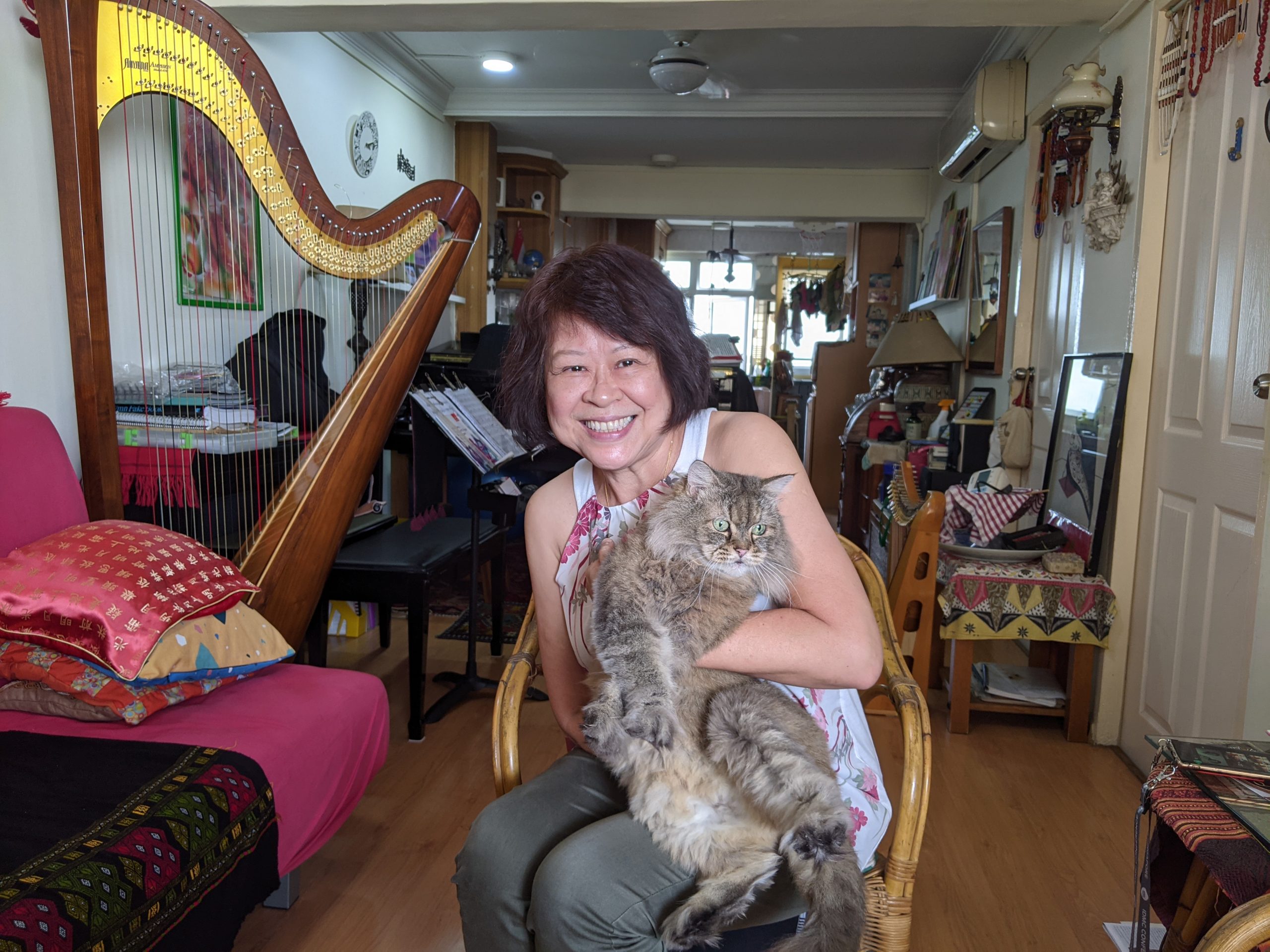
Wong with her cat, Momo, in the living room of her three-bedroom home, which has been a haven for many.
“Almost everything you see here is given,” she says. “It’s like the boy who gave his two loaves and five fishes, and he had 12 baskets left over to dabao home! It’s radical, it doesn’t make sense!”
The people at our doorstep
Pointing to the cases of abuse of foreign workers in Singapore, Wong believes it is important that we do not grow cold to the humanity of the foreigners in our land.
“What are we teaching our children? That someone else will do the dirty work for us and it’s okay to mistreat them?”
These are sons and husbands who have sacrificed much to give their families a better life, she says, adding that she cannot imagine how worried she would be if one of her sons or grandsons had to work like her migrant friends.
She also often thinks about the stressors she would face if she had to leave her family to work overseas.
“We don’t have to worship or idolise them. Just treat them as equals,” she says.
And while she understands that many migrant workers are contented to be working here despite the backbreaking work and long hours, she questions if we are sending the right message to the younger generation.
“We don’t have to worship or idolise them. Just treat them as equals.”
“Our children are watching how we treat these workers. What are we teaching them? That someone else will do the dirty work for us and it’s okay to mistreat them?
“We will have more and more cases of abuse in the next generation if we don’t teach them well,” she says.
She is encouraged when she sees her friends bring along their children to deliver food for her gatherings with her migrant friends. Some of the young ones even made 21 different handwritten cards for each of them.
“Let’s make this a norm, not an exception,” says Wong, who hopes that others will be inspired to be kind to the migrant workers around them when they hear her story.
“I cannot do anything for the construction workers as I don’t work at any construction site. I cannot take care of the cleaners in other estates. But I can do something for the people who are at my doorstep.”
FOR MORE STORIES ON MIGRANT WORKERS, READ:
One year on, the mental health needs of migrant workers remain pressing: HealthServe
We are an independent, non-profit organisation that relies on the generosity of our readers, such as yourself, to continue serving the kingdom. Every dollar donated goes directly back into our editorial coverage.
Would you consider partnering with us in our kingdom work by supporting us financially, either as a one-off donation, or a recurring pledge?
Support Salt&Light


